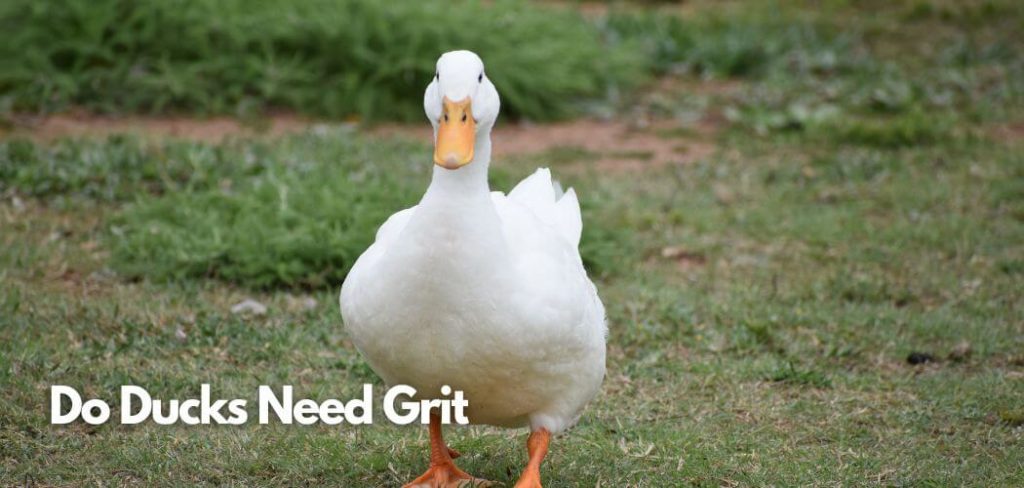If you are a duck owner, you may have heard about the importance of providing grit to your feathered friends.
But what exactly is grit, and do ducks need it? Let’s explore this topic further.

Do ducks need grit?
If you are raising ducks, you may have wondered if they need grit. The answer is yes, ducks do need grit in their diet to help them digest their food properly.
Grit is small, hard particles that ducks swallow to help grind down their food in their gizzard.
Without grit, their food would not be properly broken down, leading to poor digestion and potential health problems.
There are two types of grit that ducks need: insoluble and soluble. Insoluble grit is made up of small stones or pebbles that ducks swallow and hold in their gizzard to help break down their food.
Soluble grit is made up of calcium and other minerals that help with eggshell production and overall health.
It’s important to note that ducks should only be given grit that is specifically designed for poultry.
Other types of grit, such as sand or gravel, can contain harmful bacteria or toxins that can be harmful to your ducks.
If you are raising ducks, it’s important to make sure they have access to grit in their diet to help with digestion and overall health.
Be sure to provide them with the appropriate type of grit and monitor their intake to ensure they are getting the proper amount.
Do all duck species need grit?
Not all duck species require grit for digestion. Many dabbling ducks, such as mallards and wood ducks, have a diet that consists mainly of plant matter and small invertebrates, which can be easily broken down in their gizzards.
These ducks do not need grit to aid in digestion. However, diving ducks, such as mergansers and scaups, have a diet that includes a significant amount of hard-shelled prey, such as mollusks and crustaceans.
These ducks require grit to help break down the tough outer shells of their food in their gizzards.
It is important to note that even within a single species, the need for grit can vary depending on the individual bird’s diet and feeding habits.
Therefore, it is recommended to provide grit as a supplement for all ducks to ensure optimal digestion.
What happens if ducks don’t have grit?
Grit is an essential part of a duck’s diet; without it, they can experience various health problems.
Here are some of the issues ducks can face if they don’t have access to grit:
Digestive Issues
Ducks need grit to help them digest their food properly. Without it, their food may not be broken down enough to be absorbed by their bodies, leading to digestive issues such as diarrhea and malnutrition.
Poor Egg Quality
If a duck doesn’t have enough grit, it can affect the quality of their eggs. The shells may be thin and fragile, making them more susceptible to breakage.
Reduced Egg Production
A lack of grit in a duck’s diet can also lead to a decrease in egg production. This is because the duck’s body may not be getting the nutrients it needs to produce eggs properly.
Behavioral Issues
Ducks that don’t have access to grit may become restless and agitated. They may spend more time foraging for food, which can lead to fights with other ducks.
Do baby ducks need grit?
The answer is yes, baby ducks do need grit. When ducklings are hatched, they have a special organ called the “proventriculus” that helps them digest their food.
However, this organ is not fully developed yet, and they need grit to help break down their food.
Without grit, baby ducks may have difficulty digesting their food properly, leading to health problems and even death.
It’s important to provide them with the right kind of grit and the right amount.
You can provide grit to your baby ducks by offering them chick grit or finely crushed granite. Make sure to offer it in a separate container from their food, so they can eat it as needed.
When to start feeding ducklings grit?
The general rule of thumb is to start feeding ducklings grit when they are around two weeks old. At this age, their digestive system is developed enough to handle the grit.
When feeding ducklings grit, it’s important to choose the right type of grit. You can buy commercial grit at your local feed store, or you can provide them with natural grit such as sand or small pebbles.
Natural grit is a good option as it contains a variety of minerals and nutrients that are beneficial to the duck’s health.
To feed ducklings grit, you can mix it in with their food or provide it in a separate dish.
Make sure the grit is always available to them, as they will only eat it when they need it.
How to feed ducks grit:
Feeding ducks grit is an important part of their diet. Here are some tips on how to feed ducks grit:
Provide a separate container for grit:
It’s important to provide a separate container for grit, as they will not be able to find enough on their own in their natural environment. You can use a shallow dish or container for this purpose.
Use appropriate grit:
Make sure to use appropriate grit for ducks. The grit should be small enough to pass through their digestive system, but large enough to help grind up their food.
You can purchase commercial grit specifically made for ducks or use small gravel or coarse sand.
Offer grit free-choice:
Offer grit-free choice to ducks, meaning they can access it whenever they want. This allows them to regulate their intake and ensures they have access to it whenever they need it.
Clean the container regularly:
Clean the grit container regularly to prevent the buildup of bacteria and other harmful substances. Replace the grit as needed, especially if it becomes contaminated or depleted.
By following these simple tips, you can ensure your ducks have access to the grit they need to maintain a healthy digestive system.
How often do ducks need grit?
Ducks don’t need grit every day. The frequency at which ducks need grit depends on their diet.
If your ducks are on a diet composed mainly of pellets, they may not need grit as often as those on a diet of whole grains and seeds.
Pellets are already broken down, making them easier to digest, so ducks on a pellet diet may need grit less frequently.
On the other hand, ducks on a diet of whole grains and seeds will need grit more often. This is because these foods are harder to digest, and the grit helps break them down in the gizzard.
As a general rule, ducks should be provided with grit at least once a week.
However, if you notice that your ducks are having trouble digesting their food, you may need to increase the frequency of grit supplementation.
What type of grit is available for domesticated ducks?
Domesticated duck owners can obtain grit from various sources, and they are classified into 3 types including:
Commercial grit:
This type of grit is specifically designed for domesticated ducks and is readily available in most pet stores.
It is usually made from crushed granite, oyster shells, or limestone and comes in different sizes to suit the age of the duck.
Natural grit:
Ducks can obtain natural grit from the environment, such as small stones, sand, and gravel.
However, it is important to ensure that the grit is free from harmful substances like pesticides, herbicides, or other chemicals.
Kitchen leftover grit:
Ducks can also obtain grit from kitchen scraps like eggshells, which are a good source of calcium and other minerals. However, it is important to crush the eggshells into small pieces to prevent choking.
Do ducks need grit all year round?
Yes, ducks need grit all year round for proper digestion. Without grit, ducks would not be able to properly break down their food and absorb the necessary nutrients.
In the wild, ducks obtain grit naturally by foraging in soil and gravel. However, domesticated ducks may not have access to these natural sources of grit, so it’s important to provide them with a suitable alternative.
You can provide grit to your ducks by offering commercial poultry grit, crushed oyster shells, or even sand.
It’s important to choose a grit size appropriate for your duck’s age and size, as larger ducks require larger grit.
Best grit for ducks?
When it comes to providing grit for your ducks, it is important to choose the right type to ensure their health and well-being.
Here are some of the best grit options for ducks:
Oyster shell grit:
Oyster shell grit is an excellent source of calcium, which is essential for strong eggshells and healthy bones.
It is also rich in other minerals, such as magnesium and potassium. Oyster shell grit is typically made from crushed oyster shells and is available in both pellet and powder form.
Granite grit:
Granite grit is a natural source of grit that is commonly used for poultry. It is made from crushed granite and is a good source of insoluble grit, which helps to break down food in the gizzard.
Granite grit is available in various sizes and can be purchased in pellet or powder form.
Flint grit:
Flint grit is another natural source of grit that is commonly used for poultry. It is made from crushed flint and is a good source of insoluble grit, which helps to break down food in the gizzard.
Flint grit is available in various sizes and can be purchased in pellet or powder form.
When choosing a grit for your ducks, it is important to consider their age and the type of feed they are consuming.
If your ducks are laying eggs, oyster shell grit is the best option to ensure strong eggshells.
However, if your ducks are consuming a commercial feed that already contains calcium, a natural grit such as granite or flint may be sufficient.
Final Thoughts:
While grit may seem like a small and insignificant part of a duck’s diet, it plays a crucial role in their overall health and well-being.
By providing your ducks with access to the proper type of grit, you can ensure that they are receiving the essential nutrients they need to thrive.
